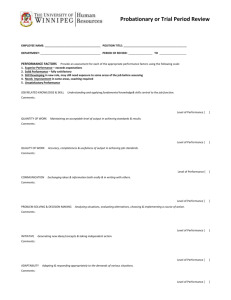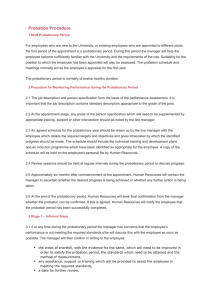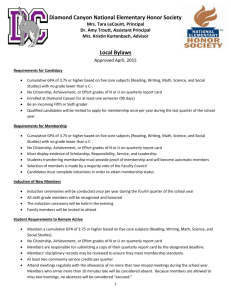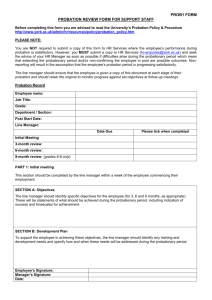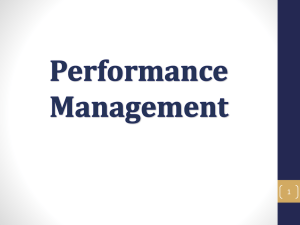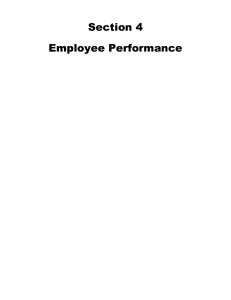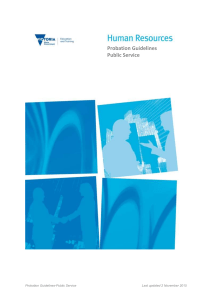Senior Staff Probation Procedure
advertisement
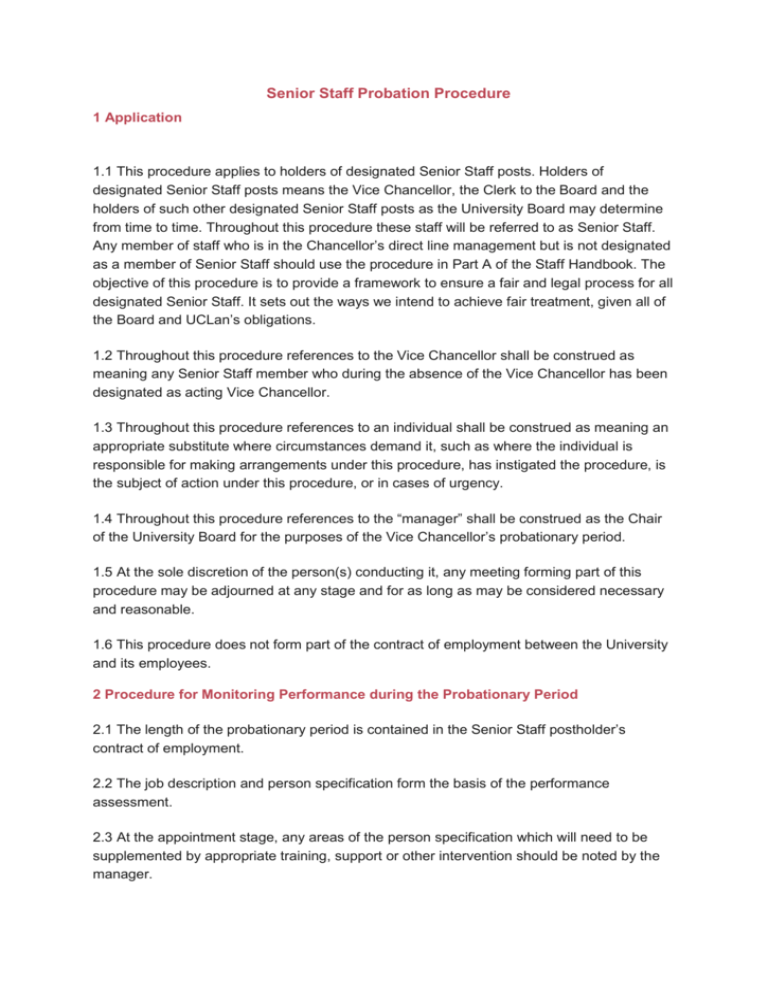
Senior Staff Probation Procedure 1 Application 1.1 This procedure applies to holders of designated Senior Staff posts. Holders of designated Senior Staff posts means the Vice Chancellor, the Clerk to the Board and the holders of such other designated Senior Staff posts as the University Board may determine from time to time. Throughout this procedure these staff will be referred to as Senior Staff. Any member of staff who is in the Chancellor’s direct line management but is not designated as a member of Senior Staff should use the procedure in Part A of the Staff Handbook. The objective of this procedure is to provide a framework to ensure a fair and legal process for all designated Senior Staff. It sets out the ways we intend to achieve fair treatment, given all of the Board and UCLan’s obligations. 1.2 Throughout this procedure references to the Vice Chancellor shall be construed as meaning any Senior Staff member who during the absence of the Vice Chancellor has been designated as acting Vice Chancellor. 1.3 Throughout this procedure references to an individual shall be construed as meaning an appropriate substitute where circumstances demand it, such as where the individual is responsible for making arrangements under this procedure, has instigated the procedure, is the subject of action under this procedure, or in cases of urgency. 1.4 Throughout this procedure references to the “manager” shall be construed as the Chair of the University Board for the purposes of the Vice Chancellor’s probationary period. 1.5 At the sole discretion of the person(s) conducting it, any meeting forming part of this procedure may be adjourned at any stage and for as long as may be considered necessary and reasonable. 1.6 This procedure does not form part of the contract of employment between the University and its employees. 2 Procedure for Monitoring Performance during the Probationary Period 2.1 The length of the probationary period is contained in the Senior Staff postholder’s contract of employment. 2.2 The job description and person specification form the basis of the performance assessment. 2.3 At the appointment stage, any areas of the person specification which will need to be supplemented by appropriate training, support or other intervention should be noted by the manager. 2.4 During the probationary period the Senior Staff member’s manager will help him/her become sufficiently familiar with the University and the requirements of the role. An agreed schedule for the probationary period should be drawn up by the manager with the Senior Staff member, which details the required targets and objectives and gives timescales by which the identified progress should be made. The schedule should include the individual training and development plans and an induction programme which have been identified as appropriate for the Senior Staff member. A copy of the schedule will be held on the Senior Staff member's personal file. 2.5 Review sessions should be held at regular intervals during the probationary period to discuss progress. 2.6 Approximately six months after commencement of the appointment, the Clerk to the Board will contact the manager to ascertain whether the objectives set in the schedule described in paragraph 2.4 are being achieved and the desired progress is being made. If the manager expresses any concerns about the performance of the Senior Staff member, the Clerk to the Board will liaise with the Director of Human Resources. 2.7 At the end of the probationary period, the Clerk to the Board will seek final confirmation from the manager as to whether the continued employment of the Senior Staff member can be confirmed. The Clerk to the Board will liaise with the Director of Human Resources as appropriate. Where successful completion of the probationary period has been confirmed by the manager, Human Resources will notify the Senior Staff member that the probation period has been successfully completed. 3 Stage 1 – Informal Steps 3.1 If at any time during the probationary period the manager has concerns that the Senior Staff member’s performance is not meeting the required standards he/she will discuss this with the individual as soon as possible. The manager will then confirm in writing to the Senior Staff member: • the areas of shortfall, with the evidence for the same, which will need to be improved in order to successfully complete the probation period, the standards which need to be attained and the method of measurement, • any assistance, support or training which will be provided to assist the Senior Staff member in meeting the required standards, • a date for further review. A copy of this letter should be sent to the Executive Assistant to the Vice Chancellor to be placed on the Senior Staff member’s personal file. 4 Stage 2 4.1 If the steps taken to resolve issues informally have not resulted in the Senior Staff member meeting the required standards or if there are very significant concerns, the manager will advise the Senior Staff member in writing of the need to hold a formal meeting, normally giving two weeks’ notice and giving details of the issues. The Senior Staff member will have the right to be accompanied by a representative. The manager will be accompanied by the Director of Human Resources who will provide advice on the process to be followed. The Clerk to the University Board will also be present to take a formal record of proceedings. 4.2 The aim of this meeting is normally to agree and implement a series of actions to help the Senior Staff member achieve the required standards in the role, notwithstanding section 4.4 below. 4.3 The outcome of the meeting will be confirmed in writing to the Senior Staff member by the Director of Human Resources, normally within one week of the date of the meeting. Possible outcomes of the meeting are listed below. Any of these outcomes could be utilised. This list is not exhaustive: • Action will be taken to assist in raising job performance standards and a date for further review will be set. • The probation period will be extended for a fixed term, up to a maximum of six months from the end of the original period. • For Senior Staff who have previous service with the University an outcome of the meeting could be that they return to a similar post and at the level previously held, if such a post were available and such a return were appropriate and agreed by both parties. • The University reserves the right not to pay a salary increase, which might otherwise have been due, during the current year as an outcome of any of the formal stages of this probation procedure. The University reserves the right to delay the decision on a salary increase pending action under this probation procedure. If the decision is made following action under this procedure not to pay a salary increase, no payment will be made during the current year. However, if the decision is made following action under this procedure to pay a salary increase, where a decision on which had previously been delayed, the payment will be made in the next payrun and will include backdated pay to the date from which the salary increase would originally have been effective. 4.4 If it is considered by the manager that the Senior Staff member has not satisfactorily completed the probationary period (either with or without an extension to the probationary period) or that there is no prospect that the Senior Staff member will satisfactorily complete the probationary period (either with or without an extension to the probationary period), action will be taken under the Dismissal Procedure - Designated Senior Staff Postholders. 5. Appeals 5.1 The Senior Staff member has the right of appeal against a decision arising from 4.3 above. 5.2 If the Senior Staff member wishes to appeal he/she should notify the Director of Human Resources in writing within two weeks of the date of the letter giving the decision, setting out the grounds for appeal and including copies of any documentation which will be relied upon during the hearing. 5.3 The Director of Human Resources, working closely with the Clerk to the Board, will be responsible for the arrangements for the appeal hearing and will notify all parties of the date. The Director of Human Resources will provide copies of all necessary documentation to all parties, normally at least one week before the appeal hearing date. The Senior Staff member must take all reasonable steps to attend the meeting. 5.4 The Senior Staff member can be accompanied by a representative at the appeal meeting. As soon as possible (and at least 3 days) before the appeal hearing, the Senior Staff member must contact to the Director of Human Resources to say whether he/she will be accompanied and, if so, by whom. 5.5 Appeals will normally be heard by at least one independent member of the University Board. Normally the hearing will be attended by the Board member who made the decision against which the Senior Staff member is appealing, who will be supported by the Director of Human Resources, the Senior Staff member and, if chosen, his/her representative. A further member of Human Resources will also be present to advise the chair and the Clerk to the University Board will be present to take a formal record of the proceedings. 5.6 The appeal hearing will operate on the basis of reviewing the decision to which the appeal relates. Ordinarily it will be concerned with reviewing the application of the procedures, whether, on the basis of the evidence presented at the formal meeting, the outcome was appropriate and considering any new material evidence not available at the original hearing which is directly relevant to the case under appeal. New information on unrelated issues cannot be introduced. 5.7 Any sanction imposed will be reviewed but a penalty cannot be increased. The Senior Staff member will be notified of the outcome of the appeal hearing in writing by Human Resources, normally within one week of the hearing. This decision is final and no further right to appeal exists. NOTES The time limits referred to in this procedure may be modified with the agreement of all parties. Author: Human Resources Last modified: April 2012
